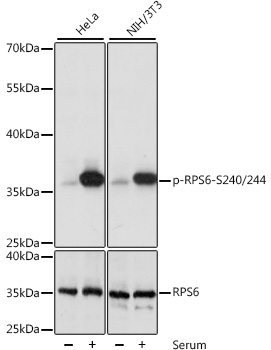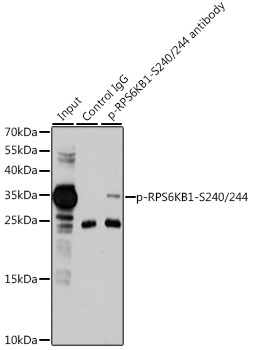Cell Biology Antibodies 16
Anti-Phospho-RPS6-S240/244 Antibody (CABP0537)
- SKU:
- CABP0537
- Product Type:
- Antibody
- Applications:
- WB
- Applications:
- IP
- Reactivity:
- Human
- Reactivity:
- Mouse
- Host Species:
- Rabbit
- Isotype:
- IgG
- Research Area:
- Cell Biology
Description
| Antibody Name: | Anti-Phospho-RPS6-S240/244 Antibody |
| Antibody SKU: | CABP0537 |
| Antibody Size: | 20uL, 50uL, 100uL |
| Application: | WB IP |
| Reactivity: | Human, Mouse |
| Host Species: | Rabbit |
| Immunogen: | A synthetic phosphorylated peptide around S240 & S244 of human RPS6 (NP_001001.2). |
| Application: | WB IP |
| Recommended Dilution: | WB 1:500 - 1:2000 IP 1:50 - 1:100 |
| Reactivity: | Human, Mouse |
| Positive Samples: | HeLa, NIH/3T3 |
| Immunogen: | A synthetic phosphorylated peptide around S240 & S244 of human RPS6 (NP_001001.2). |
| Purification Method: | Affinity purification |
| Storage Buffer: | Store at -20°C. Avoid freeze / thaw cycles. Buffer: PBS with 0.02% sodium azide, 50% glycerol, pH7.3. |
| Isotype: | IgG |
| Sequence: | STSK S |
| Gene ID: | 6194 |
| Uniprot: | P62753 |
| Cellular Location: | |
| Calculated MW: | 28kDa |
| Observed MW: | 36kDa |
| Synonyms: | RPS6, S6, RPS6 |
| Background: | Ribosomes, the organelles that catalyze protein synthesis, consist of a small 40S subunit and a large 60S subunit. Together these subunits are composed of 4 RNA species and approximately 80 structurally distinct proteins. This gene encodes a cytoplasmic ribosomal protein that is a component of the 40S subunit. The protein belongs to the S6E family of ribosomal proteins. It is the major substrate of protein kinases in the ribosome, with subsets of five C-terminal serine residues phosphorylated by different protein kinases. Phosphorylation is induced by a wide range of stimuli, including growth factors, tumor-promoting agents, and mitogens. Dephosphorylation occurs at growth arrest. The protein may contribute to the control of cell growth and proliferation through the selective translation of particular classes of mRNA. As is typical for genes encoding ribosomal proteins, there are multiple processed pseudogenes of this gene dispersed through the genome. |
| UniProt Protein Function: | S6: May play an important role in controlling cell growth and proliferation through the selective translation of particular classes of mRNA. Belongs to the ribosomal protein S6e family. |
| UniProt Protein Details: | Protein type:Translation Chromosomal Location of Human Ortholog: 9p21 Cellular Component: polysome; small ribosomal subunit; membrane; perinuclear region of cytoplasm; dendrite; cytoplasm; nucleolus; nucleus; ribonucleoprotein complex; cytosol Molecular Function:protein binding; structural constituent of ribosome; protein kinase binding Biological Process: SRP-dependent cotranslational protein targeting to membrane; erythrocyte development; TOR signaling pathway; viral reproduction; translation; positive regulation of apoptosis; T cell differentiation in the thymus; gastrulation; translational termination; viral infectious cycle; glucose homeostasis; oogenesis stage; T cell proliferation during immune response; translational initiation; ribosomal small subunit assembly and maintenance; viral transcription; activated T cell apoptosis; placenta development; mitosis; mitotic cell cycle checkpoint; ribosomal small subunit biogenesis and assembly; translational elongation; cellular protein metabolic process; insulin receptor signaling pathway; mRNA catabolic process, nonsense-mediated decay; gene expression; rRNA processing; G1/S transition of mitotic cell cycle; negative regulation of apoptosis |
| NCBI Summary: | Ribosomes, the organelles that catalyze protein synthesis, consist of a small 40S subunit and a large 60S subunit. Together these subunits are composed of 4 RNA species and approximately 80 structurally distinct proteins. This gene encodes a cytoplasmic ribosomal protein that is a component of the 40S subunit. The protein belongs to the S6E family of ribosomal proteins. It is the major substrate of protein kinases in the ribosome, with subsets of five C-terminal serine residues phosphorylated by different protein kinases. Phosphorylation is induced by a wide range of stimuli, including growth factors, tumor-promoting agents, and mitogens. Dephosphorylation occurs at growth arrest. The protein may contribute to the control of cell growth and proliferation through the selective translation of particular classes of mRNA. As is typical for genes encoding ribosomal proteins, there are multiple processed pseudogenes of this gene dispersed through the genome. [provided by RefSeq, Jul 2008] |
| UniProt Code: | P62753 |
| NCBI GenInfo Identifier: | 51338632 |
| NCBI Gene ID: | 6194 |
| NCBI Accession: | P62753.1 |
| UniProt Secondary Accession: | P62753,P08227, P10660, Q4VBY7, Q8N6Z7, |
| UniProt Related Accession: | P62753 |
| Molecular Weight: | 249 |
| NCBI Full Name: | 40S ribosomal protein S6 |
| NCBI Synonym Full Names: | ribosomal protein S6 |
| NCBI Official Symbol: | RPS6 |
| NCBI Official Synonym Symbols: | S6 |
| NCBI Protein Information: | 40S ribosomal protein S6; phosphoprotein NP33 |
| UniProt Protein Name: | 40S ribosomal protein S6 |
| UniProt Synonym Protein Names: | Phosphoprotein NP33 |
| Protein Family: | 30S ribosomal protein |
| UniProt Gene Name: | RPS6 |
| UniProt Entry Name: | RS6_HUMAN |








